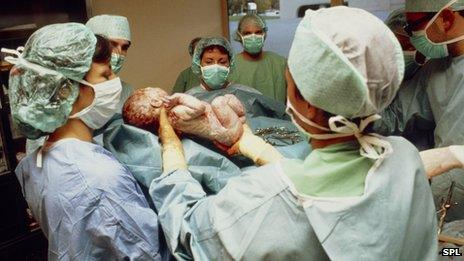Liverpool Women's Hospital in relocation warning after cash row
- Published

The hospital recruited 25 more midwives last year
Liverpool Women's Hospital may have to relocate because it does not get enough NHS money to fund sufficient staffing levels, its chief executive has said.
Kathryn Thomson said the funding crisis was caused by the "disconnect" of staff levels and money allocated by the NHS.
She said one option would be to move services from the £30m hospital, which only opened 20 years ago.
A Department of Health spokesperson said: "We expect all NHS trusts to have a strong grip on their finances."
After investing more than £1.4m in recruiting 25 extra midwives and 10 neonatal nurses last year, the hospital has been left with a £2.1m funding deficit.
'Financially unviable'
Ms Thomson said: "There is a disconnect with the cost of staffing aligned with what we get paid for maternity services from the NHS national maternity tariff.
"The view we have taken as an organisation is that we're going to invest in those levels to make sure our staffing is safe."
The chief executive said the hospital was considering options, including moving to a new location, after being told the trust risks becoming "financially unviable".
"Location is important in terms of access for patients but what are more important are the services that people are offered," she added.
Ms Thomson said the hospital's future was safe and stressed that frontline clinical jobs were safe.
The decision on whether to relocate could be taken towards the end of the year, in line with wider plans for the city's healthcare from its NHS clinical care commissioning group.
Other options include pooling "back-office functions" with its partners in Liverpool, said Ms Thomson.
The Department of Health said: "We've increased the NHS budget by £16bn over this parliament and in certain cases provide financial support to some trusts, dependent on them developing strong recovery plans, to make sure they continue to deliver excellent and safe services for patients."
- Published28 April 2013
